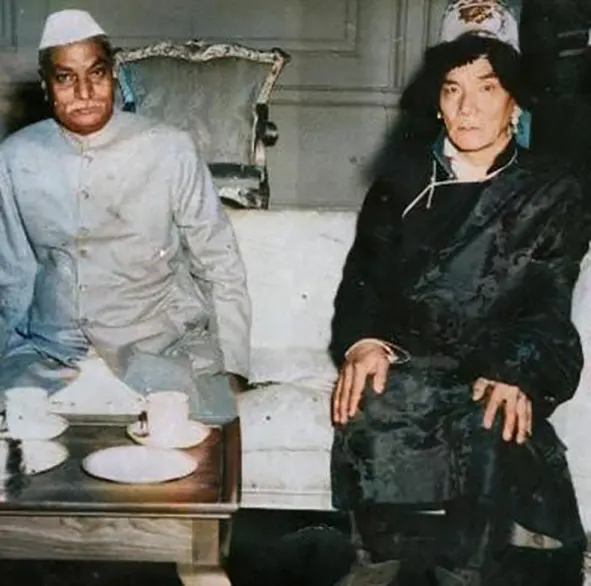[ Bengia Ajum ]
Tawang is often considered to be the jewel of India. But not many know that it was once part of the Tibetan administration, and after India gained independence, many people played a crucial role in its integration into India.
One among them was a local Monpa tribesman, late Rinchin Dhondup, fondly known as Nyerpa Khow. His life bridged the gap between tradition and modernity, spirituality and statecraft, leaving behind a legacy rooted in service and harmony.
Born in 1893 in Shernup village, Tawang, Nyerpa Khow hailed from a prominent Monpa family. The word Nyerpa in Tibetan means caretaker or administrator – a title bestowed upon him by the Tawang monastery for his integrity and wisdom.
Initially a monk at the Gaden Namgyal Lhatse (Tawang monastery), he later served in Mera Sakteng, Bhutan, where his leadership and mediation skills earned him deep respect among both monastic and local circles. He grew up in the pre-independence era, when the Mon-Tawang region was under the administrative control of Tibet, and the Tawang monastery exercised both spiritual and administrative influence over the region.
He eventually left the monastic life to shoulder family responsibilities and settled in Tsumbitse, Khrimu village, with his wife and 10 children.
His eldest daughter, Yeshi Wangmu, now in her late 80s and still residing in Tawang, fondly recalls her father’s progressive outlook, particularly his emphasis on gender equality and education. In 1945, he even took her to Lhasa, the capital of Tibet – a rare gesture at the time, symbolising his belief in empowering women through exposure and confidence.
Before independence, people from the Mon-Tawang region often travelled to Lhasa for pilgrimage and trade.
In the early 20th century, Tawang lay under the administrative influence of Tibet, despite the 1914 Simla Agreement, which recognised it as part of British India. After independence, India sought to establish its presence in the frontier regions. In 1951, Major R Bob Khathing was tasked with bringing Tawang under Indian administration, a mission fraught with political and cultural sensitivity.
Here, Nyerpa Khow’s diplomacy proved crucial. Appointed as Tawang’s first political assistant (1951-1962), he mediated between Indian officials, the Tawang monastery, and the local Monpa populace. His tact and wisdom ensured a peaceful integration of Tawang into the Indian union, achieved without a single gunshot. His name became synonymous with leadership and reconciliation.
In 1964, the Indian government established the Nehru Gonpa in Tawang to commemorate Jawaharlal Nehru’s visit. Nyerpa Khow ensured that the project reflected local culture and sentiment. Stones from the old Gyangkhar Dzong, once under Tibetan control, were used as a symbolic foundation, marking Tawang’s freedom and unity with India.
As a gesture of gratitude, Nyerpa Khow personally brought a bust of Nehru from mainland India for installation in the monastery’s prayer hall. He also participated in the immersion of Nehru’s ashes in thethe Lohit river, honouring the leader’s final wishes.
The bond between Nyerpa Khow and Major Bob Khathing evolved into a lifelong friendship and even a family tie. Khow’s son, the late Tsering Tashi, married Khathing’s daughter, Sange Lhamu. When Khathing revisited Tawang in 1985, he offered 100 butter lamps at the monastery in memory of his old comrade, a moving tribute to the man who had helped unite Tawang with India.
Nyerpa Khow passed away in 1967 after a brief illness.
Nyerpa Khow’s descendants have continued to carry forward his legacy. His children, the late Tsering Tashi, former Cabinet minister, played an instrumental role in creating Tawang district (1984) and promoting Buddhist culture. His other sons include the late Thupten Tempa, former IAS officer and Cabinet minister, who led the renovation of Tawang monastery and promoted Bothi language education; Dr Lobsang Jampa, the first state epidemiologist, who played a key role in the Covid-19 response; Tsering Wangdi, a senior state administrator; Padma Shri late Karma Wangchu – MLA from Lumla (1978-1994); and Tenzing Yangki, Khow’s granddaughter is Arunachal’s first female IPS officer.
Nyerpa Khow’s life embodied leadership rooted in humility, wisdom, and unity. His role in Tawang’s peaceful integration remains one of the most defining yet overlooked chapters in India’s Northeastern history. Though absent from formal archives, his memory endures in oral traditions, monastic circles, and in the lives of those who continue his legacy in Tawang.
As Tawang today blossoms as a centre of culture and spirituality, Nyerpa Khow’s name stands as a reminder that true nation-building begins not with force, but with understanding, and that service is indeed the truest inheritance. In every sense, he is the real unsung hero who played a crucial role in the integration of Tawang into the Indian union.
It is time his massive contribution is recognised, and the Government of Arunachal Pradesh should take the initiative to honour this historic figure who truly deserves a place in the recorded history of the state.

